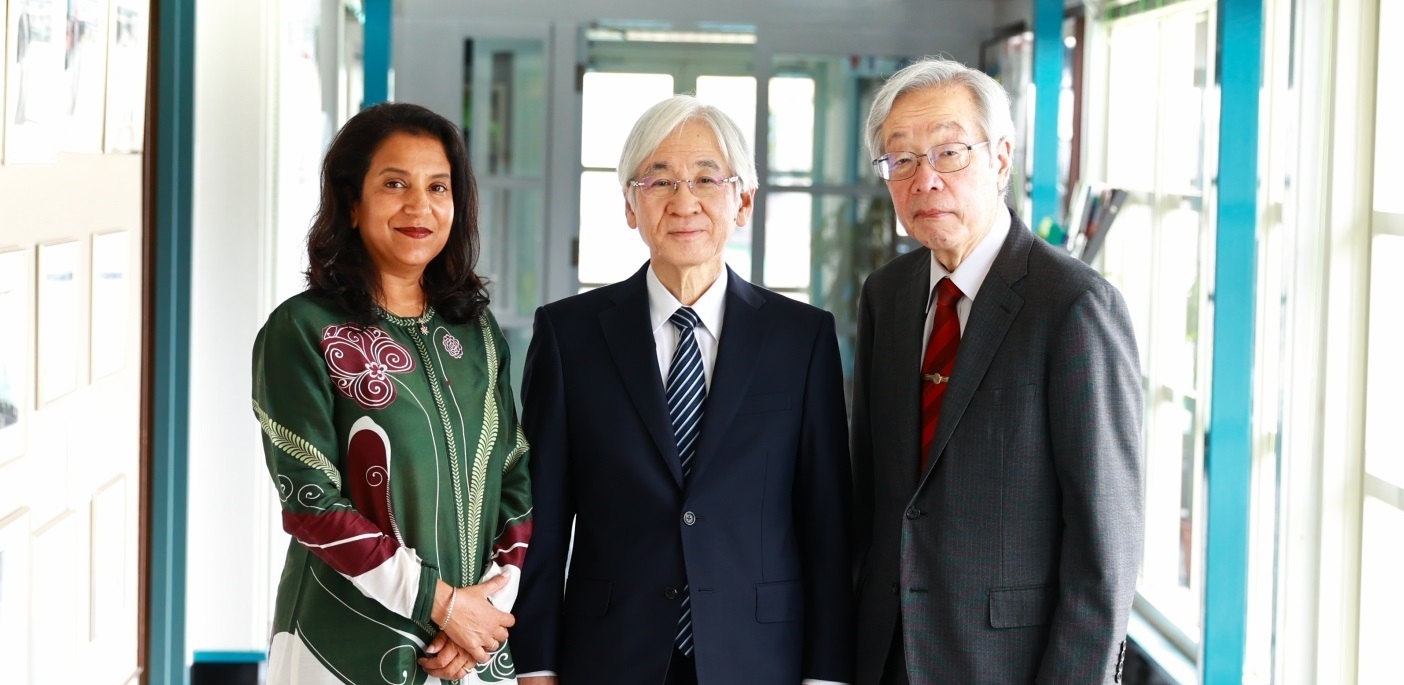Greetings

- Preetha Rajaraman,
Vice Chair and Executive Director - Kenji Kamiya,
Chair and Representative Director - Kazunori Kodama,
Executive Director
The Radiation Effects Research Foundation (RERF) is a collaborative Japan–U.S. research institution that was established with a clear mission, stipulated in Article 3 of its Articles of Incorporation: “to conduct research and studies for peaceful purposes on medical effects of radiation and associated diseases in humans, with a view to contributing to maintenance of the health and welfare of the atomic bomb survivors and to enhancement of the health of all humankind.” In collaboration with numerous individuals, beginning with atomic bomb survivors and their children in Hiroshima and Nagasaki, as well as the residents of both cities, medical associations, universities, and government officials, scientists from Japan and the U.S. are conducting research to bring to light the health effects of atomic bomb radiation in a variety of disciplines, including epidemiology, clinical medicine, radiobiology, genetics, and immunology. The achievements of RERF’s research resulting from decades of cooperation from atomic bomb survivors and their children serve as the foundation for government policies to support atomic bomb survivors, such as certification of A-bomb survivor status, health care, medical assistance, and other forms of assistance. Moreover, the findings have been used by international agencies as the basis for formulating global radiation-protection standards and have contributed extensively to reducing the risk of many types of radiation exposure, including in occupational and medical settings.
RERF’s predecessor, the Atomic Bomb Casualty Commission (ABCC), was established by the U.S. National Academy of Sciences in 1947. In 1975, the governments of Japan and the United States reached an agreement to establish RERF as a public interest corporation under jurisdiction of the Japanese Ministry of Foreign Affairs and the Japanese Ministry of Health and Welfare (now known as the Ministry of Health, Labour and Welfare). The operation of RERF is a collaborative effort between the U.S. and Japanese governments, with the organization taking over responsibility for ABCC’s original research. RERF’s research initiatives are guided by the recommendations of its Scientific Advisory Committee, which is made up of elected members from both countries. Furthermore, the organization actively engages with Local Advisors and Local Liaison Councils in Hiroshima and Nagasaki, incorporating their valuable perspectives into RERF’s research undertakings.
The goal of ABCC-RERF is the elucidation of long-term effects of radiation exposure. RERF’s research is characterized by carefully organized, long-term follow-up of large cohorts. The studies’ scale, composition, and follow-up precision are unrivaled anywhere in the world. Since they began, RERF’s studies have sustained high participation rates for examinations and achieved a high degree of precision that is acclaimed around the world. For this, we express our profound gratitude for the contributions of atomic bomb survivors and their children.
More than 75 years have passed since the atomic bombs were dropped on Hiroshima and Nagasaki, but another 20 years are needed to complete the follow-up of atomic bomb survivors who were young at the time of the bombings. Even more time will be needed to study health effects in the children of the survivors. Meanwhile, remarkable advances in science and technology have opened new horizons in the field of radiation effects research. To further elucidate the effects of radiation on human health, RERF is determined to incorporate such cutting-edge methodologies. In this respect, RERF’s research continues to emerge and develop. As it continues long-term follow-up studies to fulfill its mission, RERF will continue to promote the clarification of radiation effects on human health in an advanced and precise way using the newest scientific techniques. It is our hope that scientific elucidation of the effects of atomic bomb radiation on human health will assist people throughout the world to unite in the conviction that the tragedies of Hiroshima and Nagasaki must never be repeated, and thus lay the foundation for lasting peace.
Kenji Kamiya, Chair and Representative Director
Preetha Rajaraman, Vice Chair and Executive Director
Kazunori Kodama, Executive Director
